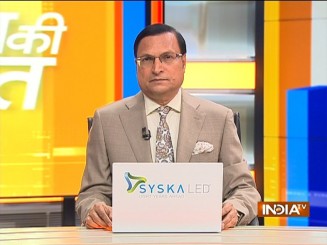How to say ‘TATA’ to the ‘RATAN’ of India?
 With the passing away of Ratan Tata and appointment of Noel Tata, aged 67 as chairman of Tata Trusts, the over $ 100 billion Tata group has undergone a major changeover. The nation mourned the death of the patriarch, as corporate chieftains, top political leaders and celebrities came to pay their last respects in Mumbai. Under Ratan Tata, the group rose from a turnover of $4 billion to over $100 billion in 21 years. From salt, tea and coffee to airconditioners, cars, trucks, airlines, hotels, hospitals, steel and telecom, one can find the Tata group omnipresent in everyday life of each Indian. Ratan Tata was not merely a businessman or the patriarch of the group. He was an institution. He was the ideal industrialist, inspiration for youths and a blessing for the poor. It was he who brought the Tata group in the international automobile sector, gave the Indian middle class a dream to own a car.
With the passing away of Ratan Tata and appointment of Noel Tata, aged 67 as chairman of Tata Trusts, the over $ 100 billion Tata group has undergone a major changeover. The nation mourned the death of the patriarch, as corporate chieftains, top political leaders and celebrities came to pay their last respects in Mumbai. Under Ratan Tata, the group rose from a turnover of $4 billion to over $100 billion in 21 years. From salt, tea and coffee to airconditioners, cars, trucks, airlines, hotels, hospitals, steel and telecom, one can find the Tata group omnipresent in everyday life of each Indian. Ratan Tata was not merely a businessman or the patriarch of the group. He was an institution. He was the ideal industrialist, inspiration for youths and a blessing for the poor. It was he who brought the Tata group in the international automobile sector, gave the Indian middle class a dream to own a car.
Ratan Tata owned billions worth properties, but he always preferred to stay with his roots, living a simple life. During Covid pandemic, he opened the doors of Taj Hotel for patients who were unable to get beds in hospitals. His heart for the canines led him to refuse an invitation to the Buckingham Palace, because his pet dog was ill and he did not want to leave his side. When workers were being asked to vacate their homes, he listened to the appeal of workers and gave ownership rights to the employees. His vision was big. His group acquired international automobile brands Land Rover and Jaguar, and when the government-owned Air India was in dire straits, Ratan Tata decided to acquire Air India and gave it a new facelift. He had the Midas touch and made whichever industry he acquired a success. Words are not sufficient to speak about Ratan Tata’s philanthropic acts. While the doyens of Indian corporates, Microsoft founder Bill Gates, top politicians and celebrities paid their last respects to the departed patriarch, why was the common man on the street emotional on learning about Ratan Tata’s death? He was a businessman, he earned money for his companies, but why was the common Indian sad? One should try to understand.
Ratan Tata did not earn fame because of his wealth. It was the love and affection of the common man, because of his basic qualities, that made him great. Normally you do not find such levels of humility among people who head corporates. Ratan Tata was soft-spoken, the epitome of humility. He never showed off his wealth or displayed his clout. Yet he was always ready to help the needy. We heard many stories about how he helped people when somebody wanted assistance to build a hospital, when somebody wanted financial help for treatment, and when a person sought his help in getting admission. He had a large heart. Ratan Tata preferred to live a simple life, devoid of the usual trappings. He preferred to drive his car himself. He never moved around with his entourage of assistants. The common man noticed how Ratan Tata used to strictly follow protocol. Getting a physical body security check, or standing in a queue at an airport was not a problem for him. These are matters which one saw in public. But there are matters which outsiders do not know.
He had a clear heart. He never used unfair means to expand his business. He never used questionable means to dislodge his competitor. All these qualities came to the fore during his interactions, when he spoke to the new generation. Many a times he used to speak about trivial matters. He used to tell the youths not to start business only for making money. He used to advise them to start business to create a new identity. Such advices from Ratan Tata were followed by most of the people who had the fortune to interact with him. Men like Ratan Tata do not die. They rule the hearts of people with their work, their thoughts, their simple life and their personality. They live forever. For the young generation, its biggest tribute to Ratan Tata could be: at least learn something from his life and implement it in your own life.